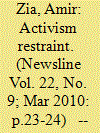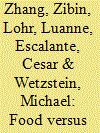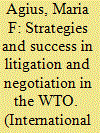|
|
|
Sort Order |
|
|
|
Items / Page
|
|
|
|
|
|
|
| Srl | Item |
| 1 |
ID:
093767


|
|
|
|
|
| Publication |
2010.
|
| Summary/Abstract |
Should the judiciary be ruling on critical political issues or should it be exercising restraint?
|
|
|
|
|
|
|
|
|
|
|
|
|
|
|
|
| 2 |
ID:
093519


|
|
|
|
|
| Publication |
2010.
|
| Summary/Abstract |
Sorting out the impacts of biofuels on global agricultural commodity prices is impossible without turning to data and distinguishing between the short-run versus the long-run impacts. Using time-series prices on fuels and agricultural commodities, the aim is to investigate the long-run cointegration of these prices simultaneously with their multivariate short-run interactions. Results indicate no direct long-run price relations between fuel and agricultural commodity prices, and limited if any direct short-run relationships. In terms of short-run price movements, sugar prices are influencing all the other agricultural commodity prices except rice. With sugar the number one world input for ethanol, results indicate increased ethanol production is potentially influencing short-run agricultural commodity prices. Overall, results support the effect of agricultural commodity prices as market signals which restore commodity markets to their equilibria after a demand or supply event (shock).
|
|
|
|
|
|
|
|
|
|
|
|
|
|
|
|
| 3 |
ID:
104622


|
|
|
| 4 |
ID:
109981


|
|
|
|
|
| Publication |
2011.
|
| Summary/Abstract |
This article discusses an unknown restudy of one locale of the People of Puerto Rico Project-my own. From 1980 to 1982 the author did ethnographic fieldwork in Bo. Jauca, Santa Isabel, the research site of Sidney Mintz. Building on Mintz's work, my goal was to take our shared historical materialism further, into a broader analysis of capitalism, colonialism, class, politics, and power. Where Mintz framed his study within production units, such as Colonia Destino and Central Aguirre, my study began with analysis of the oligarchic structure of the United States sugar industry as a whole, and how it shaped colonial policy. Where the People of Puerto Rico Project reconstructed insular class and political patterns as context for local studies, the restudy took islandwide class structure and political positions as a focus of analysis in itself. Where the earlier work chronicled the rise of a plantation system and rural proletariat, the later study explored their decline-why did the Puerto Rican sugar industry collapse, and how did seemingly homogenous Jauquenos differentiate into a graded system of stratification? The years from 1948 to 1982 saw other class transformations, as the rural proletariat was recast into the larger, more diffuse, and less politically potent category of "the poor" and life circumstances of all Jauqenos became more individuated and dependent on state power centers in San Juan and Washington.
|
|
|
|
|
|
|
|
|
|
|
|
|
|
|
|
| 5 |
ID:
113960


|
|
|
|
|
| Publication |
2012.
|
| Summary/Abstract |
This article analyzes linkages between litigation in the World Trade Organization (WTO) Dispute Settlement Body (DSB) and negotiation in multilateral trade rounds and develops a typology of links that can occur between the two processes. These include creating conditions where bargaining is informed by law, influencing the agenda-setting and creating momentum for negotiation on key issues, and affecting the status quo from which negotiations proceed by influencing interpretation of trade rules in the DSB. The purpose is to test whether poor and inexperienced states that are disadvantaged in negotiations can improve their bargaining power in negotiation rounds by pursuing legal proceedings, to see whether links can be exploited for strategy-making to promote the interests of these states, and to discuss how the WTO as an international organization benefits from their empowerment. The strategies suggested in this article could improve the commitment and active participation of relatively non-influential member states. This could be conducive to perceptions of the WTO as a legitimate organization and to a more constructive climate for effective negotiations.
|
|
|
|
|
|
|
|
|
|
|
|
|
|
|
|
| 6 |
ID:
092812


|
|
|
|
|
| Publication |
2009.
|
| Summary/Abstract |
Bagasse power generation projects provide a useful framework for evaluating several key aspects of the Clean Development Mechanism of the Kyoto Protocol. On the positive side, our analysis, which draws in part from a data set of 204 bagasse electricity generation projects at sugar mills, indicates that these projects provide Annex I country investors with a cost-effective means to achieve greenhouse gas emissions reductions. Our analysis also confirms that the marketplace for Clean Development Mechanism-derived offsets is robust and competitive. Moreover, bagasse projects appear to provide a positive example in a "new wave" of clean energy investment that has replaced the earlier industrial gas projects. At the same time, we also identify two aspects of the CDM that demand improvement. First, the additionality standard needs to be tightened and made more transparent and consistent. Financial additionality should be required for all projects; however, any financial additionality test applied by the Clean Development Mechanism's Executive Board must be informed by the significant barriers faced by many projects. Second, the administrative processes for registration and verification of offsets need to be streamlined in order to prevent long registration time lags from chilling clean energy investment.
|
|
|
|
|
|
|
|
|
|
|
|
|
|
|
|
|
|
|
|
|